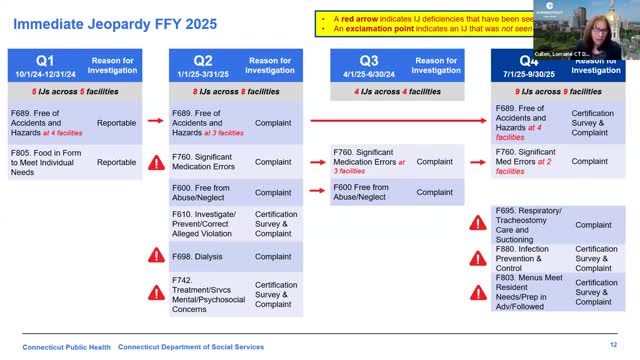State reports nine immediate‑jeopardy findings in latest quarter; quality‑of‑care and supervision among top citations
Get AI-powered insights, summaries, and transcripts
Subscribe
Summary
Connecticut Department of Public Health staff told the committee nine facilities had immediate‑jeopardy findings in the quarter ended Sept. 30, 2025; the top federal tags cited were supervision/accident hazards and quality of care, and panel members said survey findings are used for provider education.
Department of Public Health staff told committee members that the quarter ended Sept. 30, 2025, included nine immediate‑jeopardy findings across nine facilities, and that some citation categories recur quarter to quarter.
The immediate‑jeopardy (IJ) total and frequently cited deficiency categories matter because they identify safety and quality areas the state is tracking and using for targeted education and enforcement.
Lorraine Cullen, branch chief for healthcare quality and safety at the Department of Public Health, reviewed enforcement and deficiency data for the quarter and said the most common federal tags included failures to ensure residents were free from accident hazards and inadequate supervision, gaps in quality of care and services meeting professional standards, failures to prevent verbal mistreatment, and failures to notify clinicians when residents missed medications.
Cullen said examples for the top tags included staff not supervising a resident whose whereabouts were unknown and failing to act timely (accident hazard/supervision), not meeting assessed needs in the plan of care (quality of care), failing to obtain blood glucose readings and administer insulin before meals (professional standards), verbal mistreatment (abuse/neglect), and failing to notify a physician about a resident not receiving medication (notification of changes).
Cullen reported the quarter had nine IJs: four related to free‑of‑accident/hazard supervision issues, two related to significant medication errors, and three others (one each) tied to tracheostomy care/suctioning, infection control and prevention, and menu/meals meeting resident needs.
Mag Morelli, a committee member and provider representative, reminded legislators that surveys are designed to identify what is wrong and that surveyors report deficiencies they find; she and Barrett said the department’s quarterly reporting is used for provider education and outreach. Matthew Barrett said the department’s clearer quarterly presentation of enforcement data has improved transparency and been useful in member education.
Why this matters: immediate‑jeopardy findings indicate situations that place residents at substantial risk of serious harm; recurring deficiency categories point to areas where continued training, staffing improvements or process changes may be needed. Panel members described ongoing outreach and training efforts to reduce recurring citations.
The department said it will continue quarterly reporting of deficiencies and IJ trends and work with provider groups on education and remediation.
